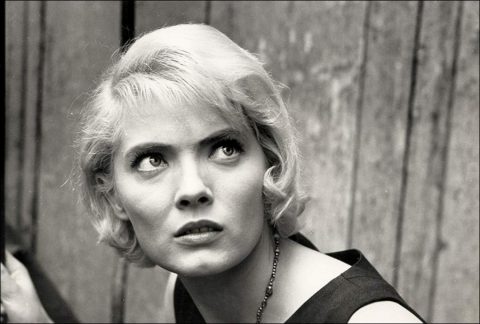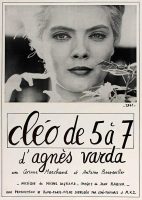The most distinguishing feature of the New Wave is that it constantly attacks the audience’s perceptions, who are inclined to believe the reality of the motion picture. No matter how real the story we watch, sometimes an external sound, sometimes suddenly split scenes, and sometimes subtitles added to the image, it reminds us that we are watching a movie.
Agnés Varda’s 1962 film Cleo de 5 7 7 breaks its link with the catharsis that the audience aims to reach through the counter that steps in every five, seven or fifteen minutes and divides the story. The movie’s lead character, Cleo, is a young singer who admires her beauty. However, when he learns that he will die in the tarot fortune, the first summer day of the year turns into an evening where he meets his fear of death.
We find ourselves trying to escape death on the streets of France with Cleo’s lonely strolls, but his arrogant inner voice constantly warns us and takes our emotions from the streets and moves them to the back of the camera. Although the story of Cleo seems as real as our life, we cannot go beyond witnessing two hours of a stranger. His internal inquiries remain solely as him, we cannot share with Cleo’s dreams or fears. In the end, Cleo, who wishes his salvation to be reluctantly, gets rid of his fears only by meeting pure love.
He stands out from the fear of death, who has not been chasing him for two hours, thanks to a man he starts to love without waiting, and when he finds out that he will start a two-month treatment, this will not affect him as badly as he expected. Cleo no longer thinks neither about the beauty she will lose nor the summer season she will say goodbye, just to stay with her beloved man a little more.
Storyline
Two hours from 17:00 to 19:00h on the longest day of the year in the life of a young Parisienne is presented. Florence Victoire, who is better known by her stage name Cléo Victoire (as in Cleopatra), is a singer with three hit singles to her name, and as such some renown.
Two days ago, she went in for some tests for abdominal issues to see if it is cancer. She will be getting the results today at 18:30h. She is certain that it will be a terminal cancer diagnosis, her mind fixated on that outcome and what it actually means. This belief affects how she approaches the day, from her encounters with friends and acquaintances to what she observes in total strangers around her. It could be as simple as how she views the lyrics to new songs presented to her from her songwriting team, to her feelings about a conversation she overhears in a café between a couple having relationship problems, to the typical sweet nothings spoken to her from her lover, José.
There are certain things that do temporarily take her mind off of waiting for the test results, but something will always bring her back to that as the issue of her day. It isn’t until just before she is ready to call the doctor that she may get a different perspective of the day and thus her life in a chance meeting with a stranger named Antoine, a French soldier at the very end of a three week leave from the Algerian War.
Cleo de 5 à 7 (1962)
Directed by: Agnès Varda
Starring: Corinne Marchand, Antoine Bourseiller, Dominique Davray, Dorothée Blanck, Michel Legrand, Lucienne Marchand, Jean-Luc Godard, Anna Karina, Robert Postec, Renée Duchateau
Screenplay by: Agnès Varda
Production Design by: Jean-François Adam
Cinematography by: Paul Bonis, Alain Levent, Jean Rabier
Film Editing by: Pascale Laverrière, Janine Verneau
Costume Design by: Alyette Samazeuilh
Art Direction by: Bernard Evein
Makeup Department: Aïda Carange
Music by: Michel Legrand
MPAA Rating: None.
Distributed by: Compagnie Commerciale Française Cinématographique (CCFC)
Release Date: April 11, 1962
Views: 133




